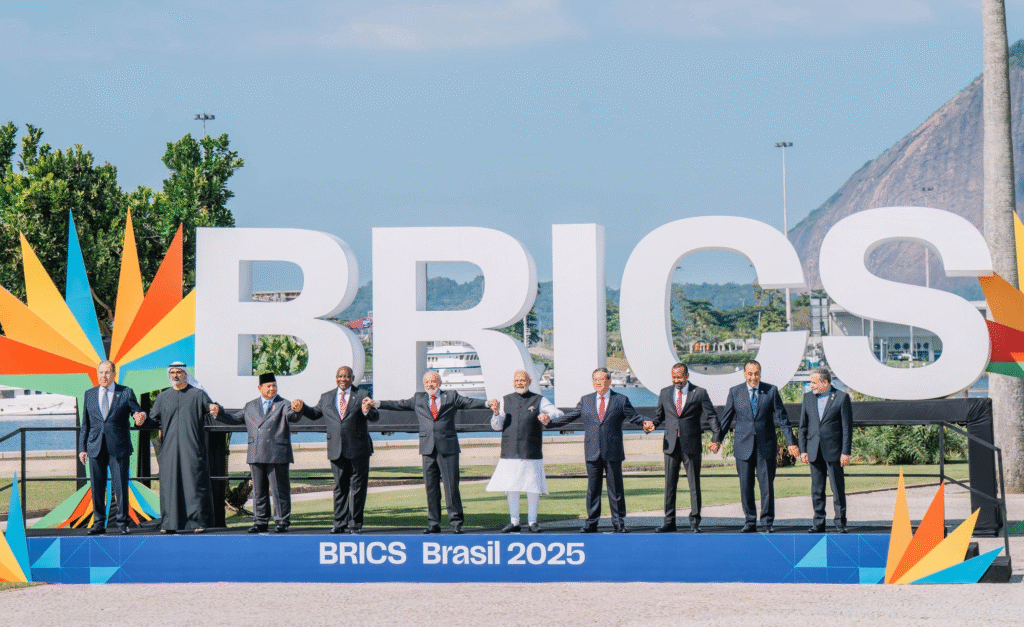The 17th BRICS Summit took place in Rio de Janeiro on July 6 and 7, with Heads of State and Government of BRICS countries, partner countries, and leadership of outreach invitees in attendance. The summit saw high level deliberations on the topics of global peace and security, reform of multilateral institutions, climate finance, global health, and artificial intelligence. Prime Minister Abiy Ahmed had a successful participation in the summit, leading a high-level delegation consisting of cabinet ministers.
The Summit endorsed three Declarations, including the BRICS Leaders Declaration covering cooperation in the fields of economy and finance, people-to-people ties, and peace and security. The Declaration reaffirmed the commitment of BRICS countries to effective multilateralism centered on the United Nations.
Additionally, the Summit saw the adoption of outcome documents from the year-long negotiations, including the Leaders Statement on Global Governance of Artificial Intelligence and BRICS Leader’s Framework Declaration on Climate Finance. The Summit also endorsed BRICS Partnership for the Elimination of Socially Determined Diseases, based on the consensus reached among Health Ministers in June 2025.
Prime Minister Abiy underscored Ethiopia’s steadfastness in advocating for peace, driving economic transformation, embracing technology and innovation, and deepening regional integration. He recalled the need to reform global decision-making institutions, including multilateral financial institutions and the UN Security Council, to ensure equitable representation of developing countries, especially from Africa. He indicated BRICS countries should continue playing their aspirational role in order to advance peace, prosperity and collective security for the benefit of all.
At the high-level session dealing with “strengthening Multilateralism, Economic- Financial Affairs, and Artificial Intelligence” and involving BRICS partner countries and invitees of the outreach, Ethiopia underscored the urgent need to revamp development finance. Expressing its grave concern on the lack of implementation of the Addis Ababa Action Agenda and the inadequacy of the “Seville Compromise,” Ethiopia forewarned the regression in sustainable development could lead to security crises, social upheaval, public health emergencies, and irregular human mobility. It therefore called upon renewed efforts to innovate new tools for generating development and climate finance. It specifically stressed the critical need for a framework for debt management and treatment, including cancellation and suspension, and the exploration of tools such as debt-for-development swaps.
Regarding Artificial Intelligence (AI), Ethiopia urged BRICS countries to lead by example through intensified cooperation in human resource development, digital infrastructure, and AI governance. Delegations called on the need to adhere to the fundamental principles of international law, particularly respect for states’ sovereignty and implementation of ethical standards in the development and deployment of AI technologies.
At the High-Level Session on “Environment, COP 30, and Global Health”, Ethiopia urged for translating commitments into tangible actions for the benefit of nations most vulnerable to climate changes’ devastating impacts. In light of this, three key areas were highlighted – adequate and predictable financial resources, revamping energy development in Africa, and urgent action against environmental degradation. Ethiopia specifically highlighted its Green Legacy Initiative as a practical contribution to addressing global warming, food insecurity, and environmental degradation, urging global attention and support for such efforts. Furthermore, Ethiopia called for enhanced local and regional production capacity for essential health goods and services to guarantee equitable and timely access to medicines, vaccines, and other medical products.
In addition to the high-level deliberations, BRICS Business Council, Women Business Alliance, Civil Council, and the New Development Bank presented their activity reports.
The 17th BRICS Leaders’ Summit was preceded by the third Meeting of BRICS Sherpas and Sous Sherpas, held from June 30 to July 5. Consensus was reached on numerous issues of global importance, including the topics Ethiopia introduced. These topics are the need to grant enhanced support for African Union peace operations, BRICS support for Ethiopia’s WTO membership, commitment of BRICS to support the United Nations to discharge its mandate, especially in light of the contemporary political and financial challenges it faces, expedited consideration of BRICS countries’ membership to the New Development Bank, and sustainable debt management mechanisms among developing countries. BRICS also expressed unified support for the 2025 theme of the African Union, “Justice for Africans and People of African Descent Through Reparations,” and a commitment to the protection of Genetic Resources, and Associated Traditional Knowledge.
The Summit saw the participation of more than thirty Heads of State and Government, and leaders of regional and international organizations. Among the prominent attendees were the United Nations Secretary-General, the Chairperson of the African Union, the Director-General of the World Trade Organization, and Leaders of other influential regional and international bodies

